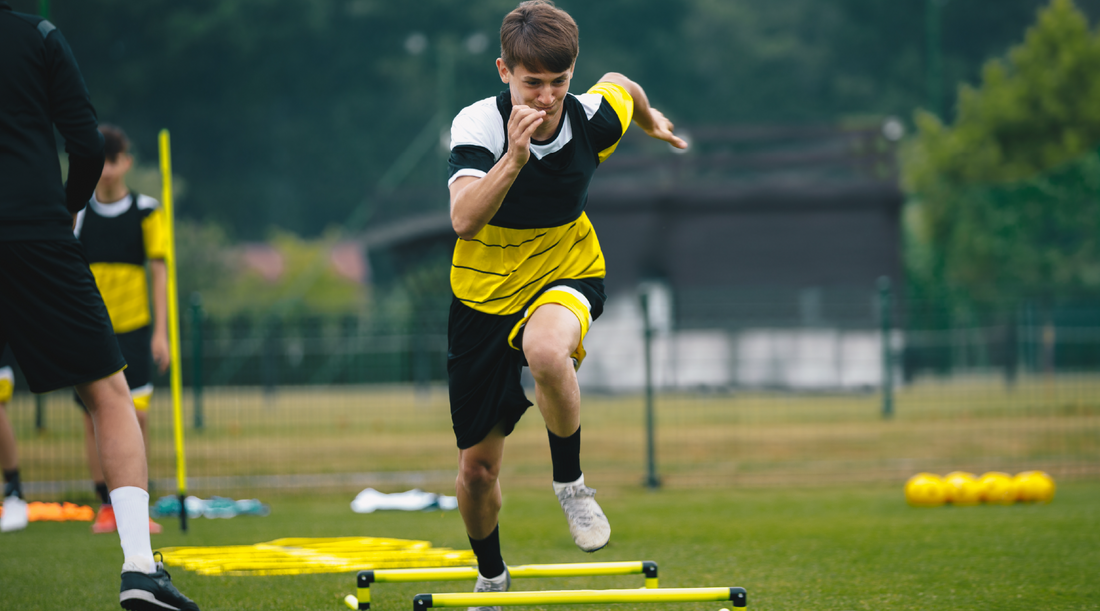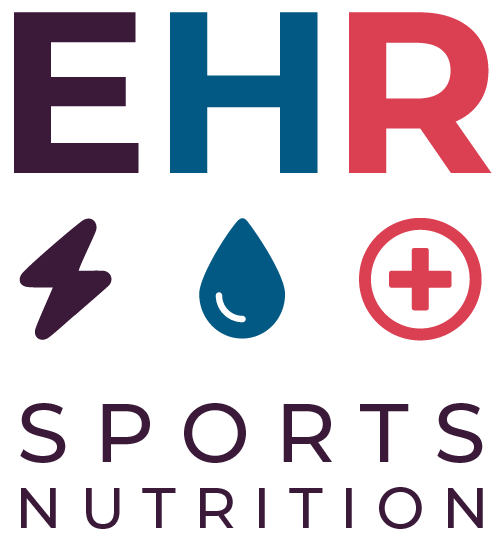
Energy Gels for football? The ultimate guide to Energy, Hydration & Recovery for Football
Share
How does your body use energy in football?
When we play football, we burn calories. Therefore, it can be an excellent way to improve our body composition. When playing football, we utilise energy aerobically (using fat) and anaerobically (using carbohydrates).
Aerobic exercise is when the oxygen you breathe gets to your muscles via your lungs and heart. Aerobic exercise is therefore associated with a lower-intensity activity.
However, the anaerobic system becomes the predominant energy system when the activity is high-intensity. Your anaerobic system can produce energy much more rapidly.
Football players tend to perform a mix of high-intensity - like sprinting - and low-intensity - like jogging - exercises during a match. Typically this would be a breakdown of a football match.
- 25% walking
- 37% jogging
- 20% high-intensity running
- 11% sprinting
- 7% running backwards
When you exercise for an extended period, your body will deplete its carbohydrate stores, which is why you might see long-distance runners and cyclists using carb gels to replace those lost. Using Energy Gels provides the body with the energy it needs to perform.
Energy gels are helpful in football to keep you going before and during a match. Below we look at some of the most popular Energy Gels. There are also alternatives to gels. For example, you might prefer an energy bar or a drink mix which can give you the same results.
EHR are specialists in Sports Nutrition, focusing on Energy, Hydration & Recovery throughout all sporting activities. You can jump straight to our product range here.
Are Energy Gels good for football?
Energy Gels are great for football. Gels are designed for athletes to give their bodies the energy it needs to keep going.
The simple sugars in energy gels go into your bloodstream as glucose, giving you a spike in energy. Active muscles and organs then absorb it. Although energy gels aren't a direct replacement, as you can't control which muscles the glucose goes to, they help fuel your activity.
Energy gels contain about 25g of carbohydrates per gel in the form of simple sugars, an accessible energy source for your body to process. One gel provides about 45 minutes of activity. But taking two at a time doesn't mean you'll have 90 minutes. Instead, you're likely to crash as your body attempts to process the sugar.
How fast do energy gels work?
The process happens within minutes. Just how quickly you feel the benefit and how long the effect lasts depends on your physiological makeup and the intensity of your effort, but you should feel the results within five minutes. So what does five before every 45 mean? It's a phrase in sports nutrition, meaning one gel 5 minutes before 45 minutes of activity.
Are there Energy Gel alternatives?
There are alternatives to Energy Gels that get the same results. The main ones are Energy Bars, Energy Drinks & Energy Chews.
What is an Energy Bar?
As the name suggests, these bars are rich in ingredients that provide instant energy. Rich ingredients like granola, oats, nut, and seeds make these bars rich in power for an instant energy boost for your body. These bars boost instant energy during short exercise sessions like running or cycling. Energy Bars consist of all the healthy ingredients, making them suitable for everyone as there is no added sugar.
What Energy Bars are best for football?
The OTE Duo Bar, Veloforte Energy Bar and the HIGH5 Energy Bar are all excellent products for football. You can view our entire range of Energy Bars here.
What is an Energy Drink?
Not to be confused with 'Sports Drinks', an Energy Drink boosts performance by rehydrating and replenishing depleted energy stores, meaning you can perform at your best for extended periods.
What Energy Drinks are best for football?
The Precision Fuel Drink Mix and the Fixx Fuel X are excellent products for football. They provide you with carbs and electrolytes in drink form. Please view our entire range here.
What are Energy Chews?
They are a popular endurance sports nutrition supplement designed for eating while exercising. They are a convenient way to consume carbohydrates. In addition, they're easy to carry and provide a concentrated energy source.
What Energy Chews are best for football?
Clif Bloks and GU Energy Chews are popular and work well for football. The entire range is here.
What Energy Gel do footballers use?
The choice of Energy Gel is down to personal preference; there is a massive range of flavours, ingredients and consistencies out there, so we always recommend trying a few and see which works best for you.
Some of the most popular Energy Gels for football are
When should I take energy gels for football? Fuel strategy from warm-up to fulltime
We recommend eating your pre-match meal 2-3 hours before the game to allow digestion and prevent stomach discomfort. Aim for a relatively light meal that is high in carbohydrates and low in fat. Pasta dishes with a tomato-based sauce are a good option. An Energy Drink can be helpful alongside a pre-match meal to increase the carbohydrate content without increasing the bulkiness of the dish, which can be beneficial for anyone struggling to eat because of pre-match nerves.
Before the match
It's a good idea to add to your energy stores before kick-off, especially as the nature of the game makes it challenging to refuel during play. Depending on your preference, an Energy Gel, Energy Drink, an Energy Bar will provide the carbs you need.
During the match
It's often hard to get things to players while play is underway, but Energy Gels can be a way for players to take on board extra energy as they can be thrown to players on the pitch.
Halftime
Halftime provides a natural break which allows players to take on both fluid and energy. The amount of carbohydrates and fluid consumed depends on the player and type of match, but each player should aim to refuel and hydrate during this period.
Both Energy Drinks and Gels will work well here to absorb carbohydrates quickly.
Second Half
Hydration and energy supply will be even more critical during the second half. All things being equal, the team with more carbohydrate energy in a hydrated state will finish stronger. It could be worth using Caffeine Gel during the game's later stages. Caffeine lowers the feeling of perceived exertion, allowing you to dig deeper.
What can I take to stop muscle cramps in football?
Cramping can be a common injury in football, especially towards the end of the game. CrampFix is a product that blocks the nerves that cause cramps. This product comes in a sachet or shot form.
What do footballers drink before a match? How to stay hydrated.
Dehydration happens when you consume less water than you use up. Drinking enough water seems like it should be the answer, yet your body will only use it to balance body fluids if you have the correct electrolytes.
Hydration tablets are a great way to rehydrate quickly. They contain electrolytes like magnesium and sugar (in the form of dextrose) plus high concentrations of hydrogen ions.
Hydration is essential to maintaining performance and fluid balance, especially in humid conditions, exercising in hot weather, or working.
For athletes, hydration tablets are a great way to help your body rehydrate.
Full-Time and Recovery
It is essential to start the recovery process as soon after the match as possible. Players should consume a Recovery Shake within 30 minutes of finishing. Recovery Drinks will help refuel muscle electrolytes and provide carbohydrates and protein in an easily digestible form.
Players should also remember to drink enough fluid to rehydrate fully, a vital part of recovery. A good evening meal should follow 1 to 2 hours later, depending on the player's preference as to when they like to eat. However, this may be challenging to achieve following evening matches, so the Recovery Shake becomes even more critical.
